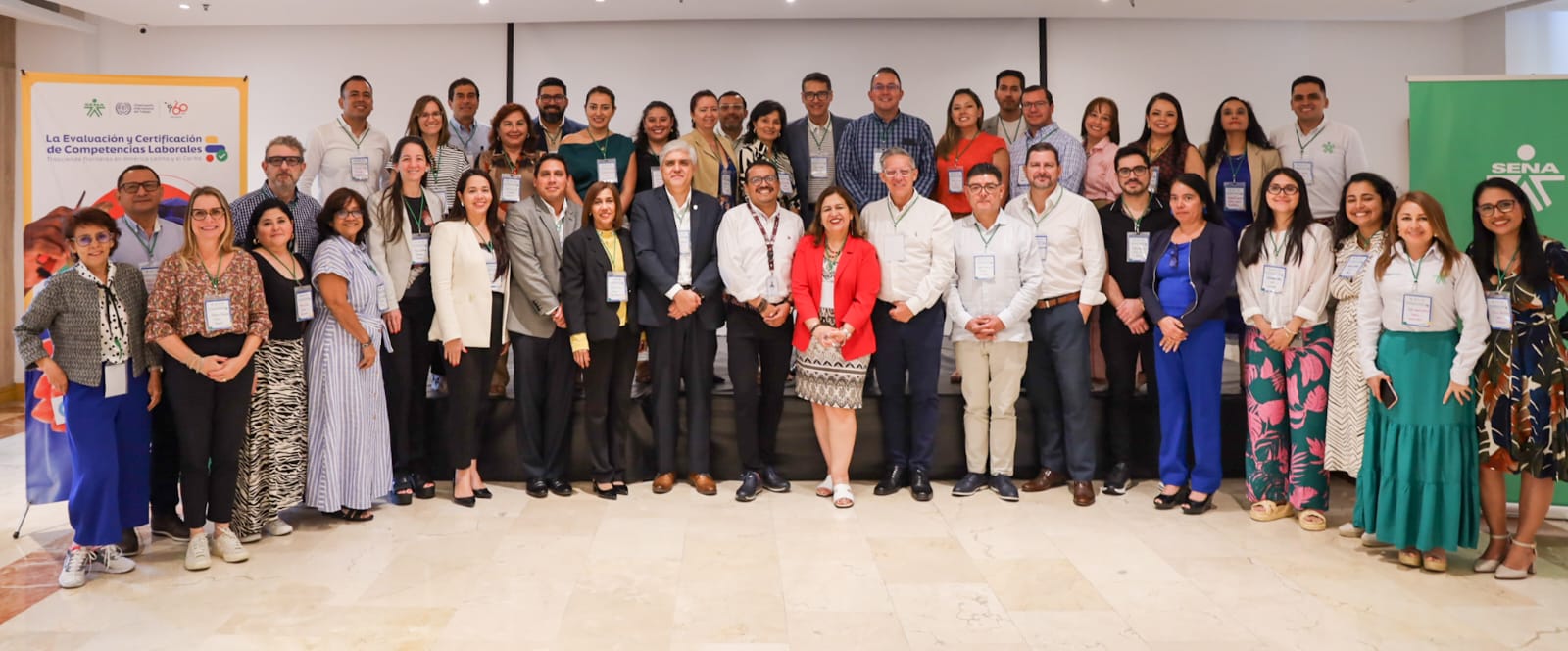Skills assessment and certification in Latin America and the Caribbean - International Summit

The International Summit: Assessment and Certification of Labour Competencies Transcends Borders in Latin America and the Caribbean brought together more than 25 specialists from across the region to share best practices in order to boost economic and social development in Latin America and the Caribbean.
For three days, representatives from 13 vocational training institutions (VTIs) from across the region met to learn about, analyse and exchange experiences and innovations in the assessment and certification of labour competencies (ECCL) and recognition of prior learning (RAP) carried out in each of their countries.
The International Summit: Assessment and Certification of Labour Competencies Transcends Borders in Latin America and the Caribbean, which took place from 13 to 15 August in Barranquilla, was led by the National Learning Service (SENA) of Colombia, in collaboration with ILO/Cinterfor and the Lazos Project of the International Labour Organization (ILO), with the support of the Swedish International Development Cooperation Agency.
Representatives from SENAR of Brazil, INFOCAL of Bolivia, ChileValora, Ministry of Labour and SENA of Colombia, INA of Costa Rica, INCAF of El Salvador, SECAP of Ecuador, INTECAP of Guatemala, INADEH of Panama, SINAFOCAL of Paraguay, SENATI of Peru and INFOTEP of the Dominican Republic participated in the event, together with a delegation of SENA staff.
The objectives of the summit focused on promoting an enriching exchange of knowledge, sharing innovations in standardisation and certification of competencies and RAP, as well as exploring new methodological approaches and emerging technologies. In addition, it sought to establish joint strategies and strengthen inter-institutional collaboration in the region.
During the event, two central strategies of SENA were presented: ‘Full Popular’ and ‘CampeSENA’, which seek to expand access to training and certification in key sectors of the economy. The National Certificatón for Young Colombians was also launched, an initiative that will offer 1,000 places for people under 28 years of age to obtain official certification in various areas of work. The agenda included visits to SENA training centres in the Atlántico, such as Finca El Caney and the Health Node, where participants were able to observe first-hand the innovative practices of SENA in the ECCL.
Jacqueline Rojas, Director of SENA Regional Atlántico, welcomed the international delegation, underlining the transformative impact of skills certification in local communities. ‘From the gastronomic tradition of the matronas to the picoteros of Barranquilla, certification has opened doors and transformed lives,’ she said. Certification not only validates knowledge and skills, but also facilitates their recognition at the international level, promoting deeper regional integration.
Carolina Ibáñez, Regional Monitoring and Evaluation Officer of the ILO's Ties Project, emphasized the importance of skills certification for the socio-economic integration of people on the move: ‘Migrants and refugees, who arrive in our countries with a wealth of experiences and skills, often face barriers that prevent them from fully integrating into the labour market. This is where skills certification plays a key role. It is not only about recognising what they know and can do, but also about opening doors for them to actively contribute to our economies and communities.
Fernando Vargas, Senior Vocational Training Specialist at ILO/Cinterfor, in addition to welcoming the event, reflected on the evolution of skills certification from its beginnings in the 1980s to the present, highlighting how certification has gone from being an educational claim to becoming a key tool for recognising people's skills and experiences. He pointed out that in the last twenty years there has been a significant growth in certification in Latin America, with millions of people certified last year. Vargas also underlined the relevance of the network of institutions involved, spanning 15 to 16 countries that have worked together under the coordination of the Centre. He highlighted the development of a new generation of skills recognition policies, which are closely related to labour mobility, social inclusion and career development, especially in critical contexts such as migration and the care economy.
Mario Rincón, SENA's National Coordinator for Labour Skills, acknowledged the work of SENA and the Ministry of Labour in the implementation of the third qualification pathway, which allows people who have not had access to formal education to obtain recognition of their skills acquired throughout their lives. In addition, he underlined the crucial role of virtuality and the media, such as radio and social networks, in democratising access to these processes, especially in hard-to-reach regions. He also highlighted the objective of unifying labour competency standards at the Latin American level, promoting the homologation and mutual recognition of certifications between countries.
Judi Caldas, Director of Mobility and Training for Work of the Colombian Ministry of Labour, underlined the importance of the RAP and the need to consider it as a crucial qualification pathway, as well as education and training for work. He also expressed the willingness of the Colombian Ministry of Labour to work closely with other countries in the region to strengthen the RAP as an instrument of equity and social justice.
During the closing of the Summit, more than 20 workers from popular economy sectors (construction and infrastructure, handicrafts, environmental services, music and tourism) in Barranquilla received certifications of labour competencies, skills and knowledge from SENA.
The Summit, held in the framework of the agreement between SENA and ILO/Cinterfor 2024, not only marks a milestone in the certification of skills, but also strengthens regional integration and the recognition of the skills of migrants and refugees, allowing them to actively contribute to the economies. Furthermore, it was consolidated as a key space to reaffirm the importance of keeping this specialised network active, promoting continuous exchange and joint collaboration.




